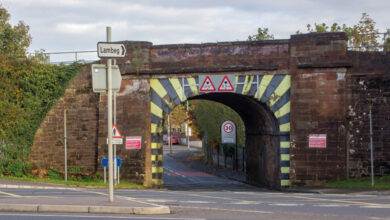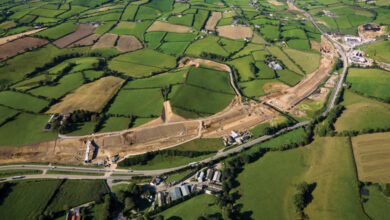Culture change
Professor Greg Lloyd calls for planning to be seen positively rather than negatively, adding that much more debate is needed about this policy field. Peter Cheney reports.
Northern Ireland needs a culture change, if its planning system is to improve, according to the author of the province’s planning review. Professor Greg Lloyd, who now heads up the University of Ulster’s School of the Built Environment also suggested that changing times mean that planning powers may need to be rethought and therefore its transfer to local government delayed.
In essence, the planning system needs reform for two main reasons, he contends.
Firstly, there have been wider changes across the UK over the last 12 to 14 years, with interested parties trying to make the planning system fit for purpose. “In other words, the planning system has been seen to be relatively inefficient, relatively ineffective and lacking transparency in engaging with civil society,” he explains.
Secondly, Northern Ireland’s unique centralised system is out of line with its neighbours across the water. Since it was centralised in 1972, local authorities have not been the “main vehicle” for making decisions around the use and development of land, which is the norm elsewhere.
Lloyd’s independent review reported in April 2008 and was followed up by the Planning Service’s reform proposals in July last year. That paper went out for consultation, closing in October, and the final version is awaiting approval from the Executive.
The proposals tie in with the ‘devolution’ of development control to the new councils and the introduction of community planning, also at local government level. They provide for preapplication community consultation, predetermination council hearings and an expanded list of statutory consultees. The latter move is to ensure that the relevant public sector bodies are consulted by the planning authorities; they will be obliged to respond within a specified timeframe. Views were also sought on whether building without planning permission should be a criminal offence.
Lloyd is pleased to see the proposals “reflecting much of the contemporary thinking around planning reform elsewhere” in the way it emphasises strategic thinking and the need to be more timely.
“It’s acknowledging that whilst developments are very site-specific and highly localised, they all actually mesh together and we need to take a broader, comprehensive, strategic view,” he says. Applications would be categorised according to their scale and importance with resources allocated in proportion.
“In a sense what the department is doing is putting together a set of ideas which I think are pointing in the right direction,” he comments. However, he qualifies that by adding that the reform process has “got caught up in the very rapidly changing economic and environmental conditions [e.g. the recession, climate change].”
Lloyd’s report had called for land use planning to be placed higher on the political agenda, given its importance to the economy. This has already happened in Scotland where the SNP moved planning policy from the communities portfolio to that of the Finance Minister.
“Now that is very, very important because suddenly the statutory planning system in Scotland was seen as a major delivery vehicle for the Scottish Executive’s social, economic and environmental priorities,” he remarks.
The National Planning Framework is debated in the Scottish Parliament and has statutory force. It also includes 14 Scottish-wide infrastructure projects, which are seen as in Scotland’s public interest.
Goals
The way in which people have thought about planning has changed over time. Development rights were nationalised in the UK in 1947 and around that time there was a “fairly loose understanding” of what the public interest was. This was seen to be rebuilding slums and developing new towns.
Increasingly, planning proposals were put out to a wider group of people so communities could have their say. In more recent times, the public interest has been alluded to implicitly i.e. the idea that economic growth is good for society, and so growth should be encouraged.
The Programme for Government’s top priority is the economy and, as Environment Minister, Sammy Wilson said the purpose of the planning system was to serve economic development.
Lloyd argues that the system’s purpose is now to secure economic, social and environmental objectives i.e. sustainable development.
“In order to deliver its expectations, [planning] has to be positioned appropriately within the system of government. It has to be a front seat driver and not a back seat passenger, which is what Mr Swinney was thinking in Scotland and I think that now is where Northern Ireland needs to start exploring,” he continues.
Planning therefore should not be seen as a “negative regulatory machine” where people get exercised when a decision goes against them. Instead, it needs to be “leading the way” and “setting a vision” for where infrastructure should be provided.
Debate
Now that “the bones of reform” have been published, Lloyd wants to see a “very deep critical reflection and political debate” taking place. He wants to see the question of how to integrate the land use planning system and the Regional Development Strategy being discussed, but is not aware that this is taking place.
On culture change, Scotland has had 10 years of debate but Northern Ireland has not really began to deal with that: “It’s a culture change for civil society, landowners, for developers and builders, for government agencies and planners themselves. It will involve – and be a challenge to – the media, it would be a challenge to different interest groups, and it would be a challenge to how we position ourselves within Europe and the global economy.”
It was put to him that a centralised planning service makes some sense as, otherwise, councillors will be under pressure from constituents not wanting developments ‘in their back yard.’ However, he responded that giving planning to local government “makes every bit of sense”.
Planning, he continues, has a technocratic side – e.g. land zoning, infrastructure, transport – and it also needs to deliver a democratic solution. Indeed, he thinks Northern Ireland has the potential to create a “very advanced planning system” due to its fast-track Strategic Projects Group which focuses on major applications.
On the second point, local authorities have been “disenfranchised” from the planning system since the early 1970s and this has led to “polarised attitudes” towards land. Devolving planning to councils should provide technocratic and democratic solutions with the Regional Development Strategy taking the strategic overview.
Asked to assess the pace of reform at present, his verdict is “far too slow”. The delay does mean that the province can learn from mistakes made elsewhere but the whole process has been overtaken by economic uncertainties, cuts in the public sector and environmental events such as the Fermanagh floods.
Lloyd suggests that now it is time to “hold fire” and look at how robust the planning reform proposals are in these changed circumstances.
Transferring powers from the centre to local authorities should also be postponed, he suggested, as the reforms may need to be adjusted in the light of changing times. He was also wary of giving the councils even more r
esponsibility at a time when they will face “major challenges anyway” by demonstrating their commitment and links to their new populations.
“Change can come about very quickly once there is political leadership, bravery and commitment,” he says in conclusion. “That demands a culture change on the part of the political leaders as well as the general public.”






